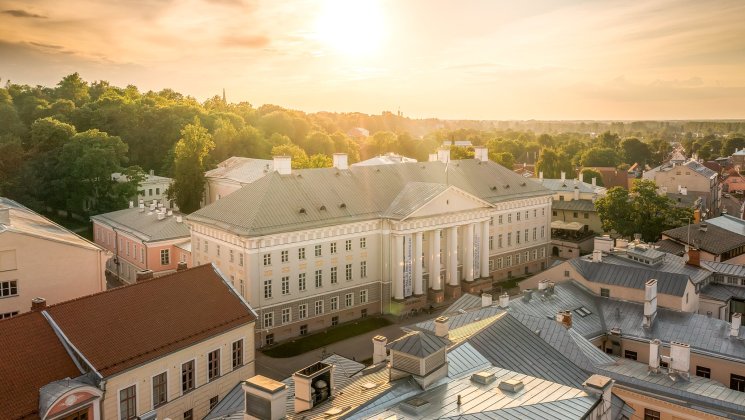Rector Toomas Asser: the measure of the national university is that our word carries weight
Inauguration speech of Rector of the University of Tartu Professor Toomas Asser in the university's assembly hall on 25 August 2023.
Toomas Asser:
Honourable President of the Republic of Estonia, honourable ministers, dear members of the academic staff,
Like our ingenious poet Artur Alliksaar said, "Greatness begins at the roots."
The roots of our greatness are in the core values of the University of Tartu. I emphasised that during the rector elections as the basis for all my activities to date and in the future. We also pointed that out in the university's welcoming address to the King of Sweden. I want these principles to resound once again here in the assembly hall today. The activities of the University of Tartu and its members are based on commonly shared core values: academic freedom and autonomy, research-based activities, openness, cooperation, human-centred approach, individual development and responsibility. Each word on this list received a new, weighty meaning two weeks ago. As a rector, I promise to uphold the university's core values uncompromisingly, just as I support and defend all members of the academic family who share these values.
The world is changing, and it must change. So will the humanity's sense of self, especially considering that future society will be, among other things, a data society. Such a society functions well when we have common ethical agreements and certainty that data, especially regarding human privacy, are handled responsibly. The university is at the heart of these changes. We also prepare our students for their future rather than for our past.
I thank the entire university family, from whom I have received strong support for my second term as rector. I take this as a confirmation that we are operating in a space of shared values and are united in our choice of the long-term direction of the national university. Your confidence in me humbles me, but I am not afraid of the responsibility because what lies ahead has been well diagnosed.
I will reflect at greater length on the meaning of the national university, a status that the University of Tartu, soon to be celebrating its 400th anniversary, proudly carries. Nothing is more important than keeping the world's only Estonian-language universitas, but, as my good colleague Erki Tammiksaar has noted, the title of the national university can also take us hostage, in a way. We cannot accept the role of a hostage, however, because, in a closed chamber, the university will lose the opportunity to keep Estonia connected with the world and lead the country's development. The concept of the national university must be unambiguous, not only for the university members but for society at large. I firmly believe that the University of Tartu, as Estonia's national university, can serve its country, state and people only if it is closely and consistently connected with the outside world.
A country with a population of one million needs allies to ensure its security. Alongside defence cooperation, a country's best security guarantee is international connections through economic, social and academic ties. To survive and thrive, a small country needs its own university, its universitas, where international excellence in research is created. It also fuels the country's development. To ensure the constant circulation of knowledge at the university, we invite international students and scholars from other countries to Tartu, and expect our own students, teaching staff and researchers to gain international experience. Preventing such circulation would result in a one-way brain drain. So far, the numbers of Estonian students studying abroad and international students studying in Estonia have been in balance, or perhaps incoming students have been even more numerous. Today, however, we can see that besides the war, other factors prevent international and doctoral students from coming to Estonia. The complicated external environment calls for a change of direction because becoming an academically closed country of emigration is not an option.
Universities have the duty to ensure quality in education and excellence in research, and to serve society. In the same way, a country must also be engaged in development besides defending its independence, its people and culture. For 15 years, digitisation has driven Estonia's economic growth; now, we need the next leap forward. As most high-tech and research-intensive companies are emerging from universities, this is also where the key to the country’s development lies. Let me assure you that there is no greater satisfaction for researchers than to see their years-long work put to good use. However, we cannot hope that the practical application of research would happen by itself. We need deliberate action to remove the barriers that have so far existed between researchers and businesses. The university has set very clear targets for the coming years, although we still need to work out the best ways for technology transfer. But we also expect support from the government to ensure that there are no unnecessary obstacles to research results reaching society and that Estonia has an innovation-friendly environment that motivates companies to invest more in research and development. Estonia still needs to reach the European target of a 1:2 ratio between public and private-sector investment in research and development. The Estonian government has kept their promise of 1% research funding; we just need to allocate this money wisely. For the private sector to get to 2%, the ambition of companies and the mindset of managers still need to change. Here, I also point out that the target set by Europe is very modest in the context of the rest of the world, and that Europe is lagging behind in research investment and, therefore, high-tech development. The key to growth lies in European capitals.
Overcoming the obstacles does not only depend on money and cooperation. Although universities often hear that the solution to financial constraints lies in cutting back on their activities, we have to admit the exact opposite at the university: our academic staff is small. This limits our possibilities to contribute to top-level science, cooperate with businesses, and advise the government. Our intellectual capacity is great; we are innovative and internationally renowned, but, unfortunately, this is not being fully realised due to the workload and shortage of staff. This gives us all the more reason to keep our top researchers, because the departure of even one high-level researcher can undermine an entire line of research.
This takes me to the topic of doctoral studies. When I ran for the rector’s position five years ago, the sorest point of the university for me was ensuring the new generation of researchers. Although we have made great progress over the past five years in improving the success of doctoral studies, we need to step up the pace. The university must have a longer bench, and there must be enough well-qualified researchers also to supply the private sector, to which we have set high expectations in terms of increasing research intensity.
Reaching doctoral studies requires the person to have completed the previous levels of higher education and have become a true researcher during this time. Unfortunately, there is a widespread attitude in society that a master's degree is something that can be done while working, as if it were a side job. Practical studies and laboratory work cannot be done at a distance either. Therefore, both the university and the state need to more purposefully work on talent policy, so that the best graduates of upper secondary schools would move on to Estonian universities, have the motivation to pursue a master's degree and consider doctoral studies as an option for continuing their learning journey. If we want the best people to come to doctoral studies, we need to be able to offer them attractive conditions in terms of pay, work environment, work culture and career prospects. Conscious effort leads to change: this year, more young Estonians entered doctoral studies than in the past. Thanks to targeted support from the state, there are also 30% more future teachers starting their studies. This is an encouraging change. The only drop of bitterness is the shortage of maths teachers.
To achieve all the objectives mentioned above, we must not interpret the role of the national university in a restrictive way. A narrow approach would easily result in quotas for the inclusion of international students, international doctoral students and international researchers. We like to think that the smallness of our nation or country does not limit Estonia's development and greatness of mind. In the same way, we do not want to see the development and growth of the university to be limited just because there are few of us, Estonians. The measure of the national university's strength is that our word carries weight – both at home in the eyes of every Estonian as for the rest of the world.
Forgive me for not dwelling more lengthily on the other problems of higher education in my speech. As I said earlier, these concerns have been well diagnosed. There is no cure for all of them yet, but a treatment plan is being drawn up and vaccines are being created. Similarly, I did not mention the major societal or global problems in solving which the universities have a role to play. Climate change, increased perception of risk and sustainable development are progressively at the forefront of our daily debates.
The role and activities of the national university can be better assessed in the perspective of decades. Our expectations must be set in light of all the tasks of the national university, and with the understanding that placing too much or too little importance on any one of them will not only throw the university out of balance but, in the longer term, society as a whole.
Vivat, crescat, floreat alma mater Tartuensis!






